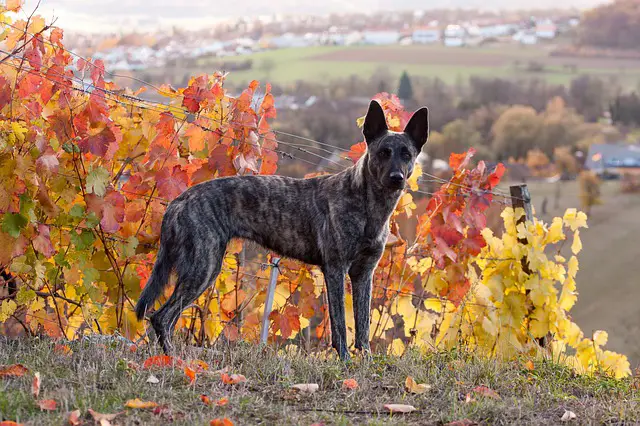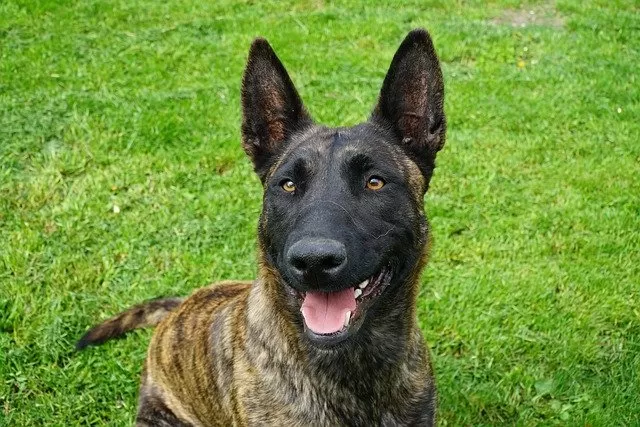The Dutch shepherd is a medium-sized dog that can be mistaken for a German shepherd and even a wolf. This shepherd has a few diverse looks, so identifying one can be a bit tricky, especially for the novice.
Dutch shepherds are an active, energetic, and very adaptable breed that can perform many different tasks and functions.
These dogs were bred for herding, but have a wide range of talents such as competing in rally obedience, dock diving, flyball, dog agility, and disc dog along with very serious and significant jobs like police work, search and rescue and working with the military. All of the above tasks require a dog that is very intelligent, talented, and easily trained.
Originally, this breed’s duties were herding, keeping sheep in a certain location, and rounding up strays.
Their stamina and athleticism allowed them to race and run the entire day and today they have not lost that endurance and vitality.
In this post, I will inform you about the somewhat mysterious and often overlooked Dutch shepherd. Also included will be the Dutch shepherd’s lifespan along with the Dutch shepherd’s temperament.

For your dog’s vitamin supplement, food, toys, or other dogs product please visit the Health Extension website.
Origin and History of the Dutch Shepherd
The Dutch shepherd originated in the Netherlands in the very late 1800s and began as a multitasker when it came to working.
Of course, this breed herded sheep, but they also herded cows for milking time and chickens by keeping them away from gardens.
They sounded the “alarm” or barked, when strangers came to call, pulled wagons with produce or milk on market days, and kept children safe as “babysitters.” These dogs were top-notch workers, shepherding on farms and ranches.
The Dutch shepherd was often confused with Belgian or German shepherds. When World War II broke out, the breeding of Dutch shepherds came to a sudden halt.
Military forces in Germany laid claim to many Dutch shepherds for use with their army.
Breeding Dutch shepherds started up again after the war, but modern farming equipment made this shepherd obsolete in many areas of the agricultural arena.
Today, the Dutch shepherd is rarer than other shepherds and sometimes challenging to find. They still have retained that innate herding ability, but are used for work as guide dogs, search and rescue, with the military and police, and also as an all-around great family pet. This breed excels in training, which is necessary for all of these lifestyles.
To check your Dutch Shepherds’ health status or their DNA checks, please visit the Embark vet website for all the help you may need.

What Are Shepherds?
Shepherds are dogs belonging to the herding group of dog breeds. Today on ranches and some farms, shepherds and other herding dogs still work, though many are family dogs as well. These dogs originally worked to herd animals such as sheep, goats, and cattle altogether and to round up stray livestock.
These dogs are essential workers on farms and ranches and also protect livestock from predators.
A few herding dogs are listed below and although shepherds can be meant as “sheepherders,” you’ll see that some of these “herding” dogs are not shepherds.
- Dutch shepherd
- Collie
- Shetland sheepdog
- Old English sheepdog
These dogs all do share many of the same traits and have all retained the instinct for herding over the years.
They are all highly intelligent and trainable, loyal, agile, quick, and have plenty of stamina.
Dutch Shepherd Appearance
The Dutch shepherd will have a height between 21.5 inches and 25 inches and can weigh from 45lbs to 70 lbs. with females generally smaller and weighing less. The German shepherd is larger than the Dutch shepherd and also stockier.
This particular shepherd has a double-thick coat like most other shepherds but the Dutch shepherd comes in three different varieties and textures of coats. Below are the three.
- Long-Haired
The long-haired Dutch shepherd has quite an abundance of fur, being straight, and long, without being wavy, bristly to the touch, and with a wool-like undercoat.
Their tail is well-furred and fluffy while the feet, ears, and head are densely coated but with shorter fur.
- Short -Haired
The short-haired Dutch shepherd still has an undercoat that is wooly but the fur is very close-cropped and short.
- Rough-Haired
This coat has an undercoat as well but the entire coat appears a bit wooly, shorter than the long-haired shepherd, and has an all-over tousled look.
The rough-haired are often referred to as wire-haired and their coat is similar to that of a wire-haired terrier. Again, this coat has a bristly feel to it.
The color of all three fur types is known as brindle which is a pattern of colors that gives the fur a mottled or even “calico-like” appearance.
The colors are silver or gold with some black or grey mixed in and sometimes the palette has shades of chestnut red or golden sand. The muzzle is mostly black.
Dutch shepherd lifespan
The lifespan of a Dutch shepherd ranges from eleven to fourteen years. This shepherd is quite a healthy breed because the Dutch have not been overbred.
They do not suffer from as many genetic conditions as the overly bred German shepherd. Some health concerns may be:
- Hip and/or Elbow Dysplasia
- Anesthesia Sensitivity
- Thyroid Conditions
Dutch Shepherd Temperament
The Dutch shepherd is an outstanding working dog but also makes a great family dog, especially for those who are active and enjoy running, walking, and hiking.
This is not a breed for the sedentary. Below are some of the extraordinary traits that make up the Dutch shepherd’s temperament.
- Intelligence
The Dutch shepherd is so extremely intelligent and today can be found in many diverse fields of work. They are easy to train because of their smarts and understanding and obeying commands quickly.
- Obedience
Once this breed is trained and learns the routine, they always follow commands and never misbehave.
- Loyalty and Protection
Dutch Shepherds form strong bonds with their families and are known for their loyalty and devotion. They thrive on human companionship and enjoy being part of a family. They are usually good with children when properly socialized and trained, but supervision is always recommended, especially with younger children due to their high energy levels.
The Dutch shepherd is loyal and protective. A very strong bond is created between this shepherd and their family.
They will protect their family from danger even to the point of risking their own life. The Dutch shepherd makes a fabulous guard dog.
- Active and Energetic
The Dutch shepherd is an extremely active and energetic dog and needs an outlet for the tons of energy they have. Again, an active family is much more suited to this breed.
They need daily exercise and quite a bit! A house with a large backyard or a nearby park is ideal.
If your Dutch shepherd does not use stored energy, it can become a nightmare by being destructive in your home.
They also need challenges that are mental as well, such as games, training and even learning tricks. This way they will not be bored.

- Affectionate
These dogs are very affectionate, and loving and enjoy being with their family. They are wonderful with children and even other pets.
- Friendly and Easygoing
The Dutch shepherd, even though protective, is very friendly and easygoing, especially with people they see you welcome. Again, they do very well with children and pets.
The Dutch shepherd has so many wonderful qualities as an extension to your family and will have many people puzzled about exactly what kind of dog they are!
This is a rarer breed but can be found in the United States, after some searching, for responsible breeders only.
A veterinarian may have information on the Dutch shepherd and breeder info too. You may have to travel to add this new member to your family.
The cost can be from $1000 to $1200. The Dutch shepherd temperament can be a perfect meld with your family.
Once trained, the Dutch shepherd will be a wonderful addition, companion, and asset to your family.